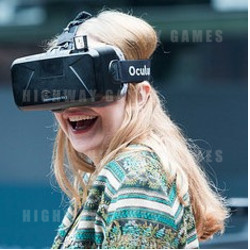The recent rise in the popularity of virtual reality (VR) has been hard to miss. Although many of the major headsets only launched in 2016, the buzz surrounding the industry is huge. That has prompted experts to predict big things.
According to CCS Insight, more than 24 million VR units will be sold by 2018, which would make the
industry worth an $4 billion.
Of course, these predictions are simply educated guesses. But, there's a lot to be positive about when it comes to VR. Gaming makes up a large part of the industry and as the technology develops the market will almost certainly expand.
Just a few months after the likes of Oculus Rift and HTC's Vive hit the shelves, VR is already having an impact in areas such as advertising, entertainment and, interestingly, health.
In fact, with Google now on the VR bandwagon, after releasing their headset
Daydream View, there are even more possibilities on the virtual horizon. By pairing it with a compatible Android device, Google Daydream View not only gives more people a way to experience VR, but its remote control feature makes it easier for novices to join the party.
The benefits of VR for gamers and thrill-seekers has long been touted by techy folk. But, between the growth of the industry and the release of new products, there's now some evidence to suggest that VR could help improve our health.
One of the most interesting ways VR could soon be used to treat illnesses is through its immersive capabilities. It has long been known that games have the ability to help
tackle cognitive illnesses such as Alzheimer's and dementia. Does this means VR could provide another effective way to stimulate sufferers’ brains in a positive way?
A 10-year, longitudinal study by the Alzheimer's Society found that brain training cut the number of dementia cases in 2785 elderly American participants. Researchers concluded that playing online games (where mental agility, memory and logic was required) helped to reduce the onset of dementia by up to 48 percent.
Research by Case Western Reserve University, Boston University and Bridgewater State University has echoed these findings and concluded that bingo, yes bingo, is good for our brains. This is because the game requires accuracy, the speed of perception and an ability to handle numbers.
The researchers found that playing bingo can combat Alzheimer's which, perhaps, is the reason your grandparents can't get enough of it. Through a process of improving an elderly person's retention and visual perception (Alzheimer's sufferers gradually lose their ability to perceive contrasts), bingo players can apparently keep their brains young long into old age.
Taking this a step further, casino games, in general, could also have the ability to delay the onset of such illnesses. Slots, blackjack and roulette are closely linked to bingo both mechanically (you're placing bets to win money) and theoretically (they all involve numbers and odds). There has already been moves to make these games a part of the VR movement.
As more developers work with products such as Oculus Rift and Leap 3D controllers, we could soon see more VR games hit the market. Microgaming has also started work on its own VR Roulette product and that is likely to be the tip of the iceberg.
For instance, instead of a player heading off to
play slots at Betway or other online casinos in their usual way, they could soon be playing VR versions of their favourite games. If a high-profile site like Betway are ready to embrace VR then it could mean that online casino games are about to get a whole lot more immersive and reach a whole new audience.
By entering a virtual world with very few distractions (as it happens when using a laptop or mobile), there's every chance players will be more focused on the task at hand. It could get interesting.
Moreover, some research into the effects of VR on the brain suggests that our neurotransmitters (the little electrical impulses that transmit messages throughout our Central and Peripheral Nervous System) can fire differently in a virtual setting than they do normally.
According to
a study by Mayank Mehta at the University of Central Lancashire (UCLA), which used rats as participants, the hippocampus (the part of the brain damaged by diseases such as Alzheimer's) maps out situations differently in VR and real-world settings. The suggestion was that it improved the rat's ability to process information. However, the ability to generalise findings from rat's brains to humans is questionable.
Of course, this isn't to say that virtual bingo, slots or roulette could become a miracle cure for dementia and Alzheimer's. But there is clear evidence to suggest it is a notion worth exploring. In fact, if this is the case then we can expect the value we place on VR to increase dramatically in the coming years.




